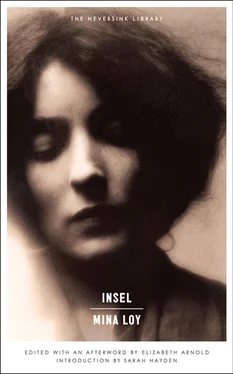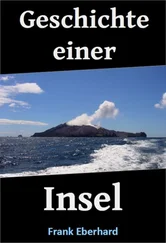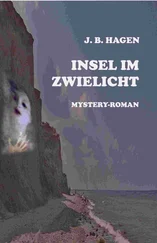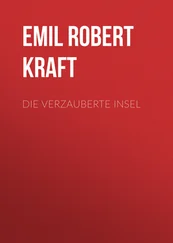And all the while Insel kept up his mixture of Beggar’s Opera and oratorio, showing a tragi-comic duality in his confidences. A coxcomb in purgatory, he enlivened a suppliant self-abasement with pranks he was proud to have played on a short-sighted mistress. Vast tracks of his barren universe were fixed in her monocle.
Our discussions of his tribulations had the light hilarity of conversation between clowns. Our shoulders almost touching, we seemed to have come within risible distance of each other. As if our imbecilic mirth were due to an assurance that suffering loses weight when tossed to and fro.
Intermittently his intriguing anxieties ceased to be actual. In his cerebral commotion, Trouble, attaining an inflation at which it burst, had no further existence except in the fragments constituting his exhortations for help which, at that, were his means of entertaining one.
Albert Londres tells of a lunatic who periodically would drop whatever he was doing to go up to the wall and say peculiar prayers to it. So Insel had two or three intimate anecdotes he had to “get off.” He told them whenever I met him with an earnestness that, like a gentle gimlet, bored into my mind. The culminative point of his corporeal life had been his threat to shoot a girl who left him for a lesbian, and of his psychic life, his magnetic rays drawing some other girl out of bed on to her balcony whenever he passed below at night.
As a prayer, repeated over and over, becoming autohypnotic, attains to faith in each retelling, these stories grew vaster, lasted longer, reached farther into a kind of absolute of confidence. As if with incantations he must summon up his past because some unimaginable impediment withheld the present and the future from him. His mind besieged the barred outlet of today-into-tomorrow in an effort to break it down and gather fresh material, but on finding itself impotent revoked to memory, dilating his souvenirs until for him the story of the universe was blotted out by the gigantism of his meager individual experience.
Externally his aspect was vague as, internally, the rudimentary ideas stored in his cerebral cells. His person withdrawing in approaching, his eyes appeared to start their staring in advance of the brows that encaved them. Between his “expression” preceding his face and his speech which so often sounded as if issuing from a distance behind him, his person melted from view. In him everything seemed inverted. His voice in its drilling intensity getting softer, louder, would go up higher, lower.
My casual ability to partake of his moods evoked my own anxiety of the past which joining in his terror of the aerial omen made it doubly real. The nomistic warning which recurred to my mind, “He who looks back returns to the maze,” I disobeyed; so intense was my intuitional curiosity as to the leak in Insel’s magnetic coherence. I felt that giving in to a dislocation of my identity, which is usually perilous or demoralizing, must in this exceptional case, be finally vindicated by a revelation of what supremely lovely essence was being conveyed to me by this human wreck. In the light of this my certitude his corporeal mendicancy appeared fictitious. So surely it was an exquisite nucleus that in his somewhat comatose exaltation he struggled to save. On the instant I accepted this salvation as equally my affair. Memory in euthanasia will come to life when fed on the same sort of stuff as that which formed it—.
Insel, the animate cadaver, stretched with the pliancy of decay from the last war into the next — while walls of solid murder with soldiers for bricks came marching in on a living aspiration — to enclose it — waste it — it must not happen again.
“ Vielleicht verkaufen ,” I could hear Insel muttering as I made this decision, obsessed by an impersonal responsibility. He was toting up imaginary accounts in payment of his passage to America.
“Promise to be my guide and companion?” he implored earnestly while staring straight before him as if it did not matter where I was.
“How tedious,” my everyday self recoiled, the lovely essence evaporating, for whenever Insel turned his profile he sort of extinguished. It was only when both his eyes were fixed upon me I entered his Edenic region of unreasoning bliss to sway among immaterial algae.
In profile, as if he cut himself in half and in halving should leave himself evil, he became so alien, so very elfin, he induced aversion. The notch at the spring of the nose was further back than the drop of the upper lip. These angles of his pasty face were over-acute and out of plumb. A kink near the ear suggested the wire-hung jaw of a ventriloquist’s dummy. In profile, this nitwit infused with the secret ghost, seemed to have been carved for a joke out of moldy wood.
“ Immer — immer spazieren —eternally taking a walk,” he insisted, once more aware of my presence; his voice dwindled to a pathos so unearthly it could only converse with the unconscious. His eyes, for dusk had fallen, were phosphorescent as approaching fireflies.
As Insel consecrated our spontaneous comradeship with his tom-tom reiterations of how he delighted to talk to me, and I, nonplussed, would hazily inquire, “What about?” I kept on naming him to myself.
“Die nackte Seele ,” and again, “Die nackte Seele.”
It seemed quite fortuitous that sitting beside him I should feel I was up against “the naked soul.” Practically anything might substitute in my consciousness for a man, who, however long I looked at him I could never entirely “put together.”
We had been sitting outside the Lutetia for six hours.
“Now,” laughed Insel, “Man Ray should pass again.”
“To conclude, we have no use for time.”
“That is not what I mean—”
“You mean that eternity spins round and round?”
We arose. But our legs become paralyzed from sitting so long on the hard little chairs, we barely saved ourselves from toppling over and staggered across the pavement. Suddenly the Metro opened at my feet. In the midst of a sentence I dropped from sight as if impelled to conform with Insel’s concepts by flickering out. One seldom took leave of him; (walking along with him one would unexpectedly drift sideways into a cab) as Insel, in an electric sputter, softly mumbled “schade.”
So now I descended the stairway — Insel leaned over it in his disgraceful grace, “When shall I see you again?” he implored, clutching his concave breast. An awesome lunar reflection lit up his face from within.
ON ONE OF MY VISITS TO TOWN INSEL DID NOT turn up, but when I left home to dine with friends I met him drifting round the corner with the wild concern of having too lately thrown off an unguessable inertia.
He greeted me with the relief of an object which, having fallen apart, should chance upon its other half again. His discomforting friable surface had slightly embodied; he even — I felt, but was not sure — took my arm: a brittle elbowing into the prelude of some danse macabre .
With a kind of epileptic cajolery he beseeched me to break my appointment. Finding this ghostly courtesy agreeable as any other, I decided to give him half an hour. I would drive to my friends instead of walking. So down we sat to suffuse another stray cafe with the ineffable haze of his contagion.
Insel, leaning back against his chair in a tall recline of felicity, groped in his pocket and took out something I could not see for he held it like a conjuror. Signing for me to hold out my hand he placed his over it as a cupola showering so discreet a sensitiveness my hand responded as a plot of invisible grasses grazed by an imperceptible breath.
“The girl,” he whispered, and the grasses parted under a couple of atomies cupped in my palm; Insel and his girl embracing — or were they Adam and Eve? “The girl gave me this,” he said, puckering his face in helpless incomprehension. “And it won’t go.”
Читать дальше












